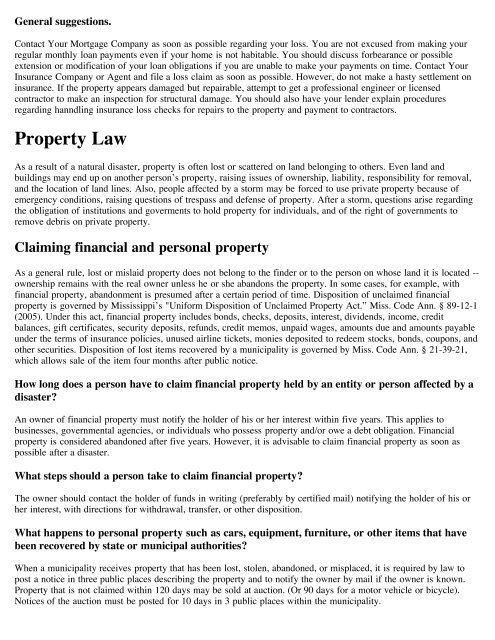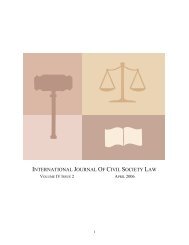Hurricane Katrina: Legal Issues - Columbus School of Law
Hurricane Katrina: Legal Issues - Columbus School of Law
Hurricane Katrina: Legal Issues - Columbus School of Law
You also want an ePaper? Increase the reach of your titles
YUMPU automatically turns print PDFs into web optimized ePapers that Google loves.
General suggestions.<br />
Contact Your Mortgage Company as soon as possible regarding your loss. You are not excused from making your<br />
regular monthly loan payments even if your home is not habitable. You should discuss forbearance or possible<br />
extension or modification <strong>of</strong> your loan obligations if you are unable to make your payments on time. Contact Your<br />
Insurance Company or Agent and file a loss claim as soon as possible. However, do not make a hasty settlement on<br />
insurance. If the property appears damaged but repairable, attempt to get a pr<strong>of</strong>essional engineer or licensed<br />
contractor to make an inspection for structural damage. You should also have your lender explain procedures<br />
regarding hanndling insurance loss checks for repairs to the property and payment to contractors.<br />
Property <strong>Law</strong><br />
As a result <strong>of</strong> a natural disaster, property is <strong>of</strong>ten lost or scattered on land belonging to others. Even land and<br />
buildings may end up on another person’s property, raising issues <strong>of</strong> ownership, liability, responsibility for removal,<br />
and the location <strong>of</strong> land lines. Also, people affected by a storm may be forced to use private property because <strong>of</strong><br />
emergency conditions, raising questions <strong>of</strong> trespass and defense <strong>of</strong> property. After a storm, questions arise regarding<br />
the obligation <strong>of</strong> institutions and goverments to hold property for individuals, and <strong>of</strong> the right <strong>of</strong> governments to<br />
remove debris on private property.<br />
Claiming financial and personal property<br />
As a general rule, lost or mislaid property does not belong to the finder or to the person on whose land it is located --<br />
ownership remains with the real owner unless he or she abandons the property. In some cases, for example, with<br />
financial property, abandonment is presumed after a certain period <strong>of</strong> time. Disposition <strong>of</strong> unclaimed financial<br />
property is governed by Mississippi’s "Uniform Disposition <strong>of</strong> Unclaimed Property Act.” Miss. Code Ann. § 89-12-1<br />
(2005). Under this act, financial property includes bonds, checks, deposits, interest, dividends, income, credit<br />
balances, gift certificates, security deposits, refunds, credit memos, unpaid wages, amounts due and amounts payable<br />
under the terms <strong>of</strong> insurance policies, unused airline tickets, monies deposited to redeem stocks, bonds, coupons, and<br />
other securities. Disposition <strong>of</strong> lost items recovered by a municipality is governed by Miss. Code Ann. § 21-39-21,<br />
which allows sale <strong>of</strong> the item four months after public notice.<br />
How long does a person have to claim financial property held by an entity or person affected by a<br />
disaster?<br />
An owner <strong>of</strong> financial property must notify the holder <strong>of</strong> his or her interest within five years. This applies to<br />
businesses, governmental agencies, or individuals who possess property and/or owe a debt obligation. Financial<br />
property is considered abandoned after five years. However, it is advisable to claim financial property as soon as<br />
possible after a disaster.<br />
What steps should a person take to claim financial property?<br />
The owner should contact the holder <strong>of</strong> funds in writing (preferably by certified mail) notifying the holder <strong>of</strong> his or<br />
her interest, with directions for withdrawal, transfer, or other disposition.<br />
What happens to personal property such as cars, equipment, furniture, or other items that have<br />
been recovered by state or municipal authorities?<br />
When a municipality receives property that has been lost, stolen, abandoned, or misplaced, it is required by law to<br />
post a notice in three public places describing the property and to notify the owner by mail if the owner is known.<br />
Property that is not claimed within 120 days may be sold at auction. (Or 90 days for a motor vehicle or bicycle).<br />
Notices <strong>of</strong> the auction must be posted for 10 days in 3 public places within the municipality.

















